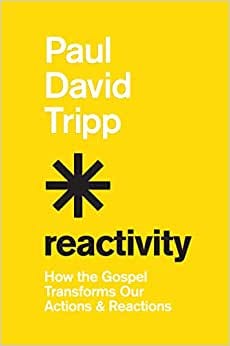I'm not entirely sure what to do with or say about this book. I picked it up for two reasons: firstly, the relatively little I know of Tripp has impressed me as a sensitive, careful, wise presence trying to write graciously and build grace into people's lives, secondly I do spend a reasonably fair amount of time 'online', though less these days (thankfully), but certainly over time I've been involved in a lot of online communication.
And that's kind of the premise for this book - the culture that Tripp perceives of 'reactivity', being the way people respond, react, on social media in a way that is depressingly dark, unloving, biting, hostile, and among believers - unfitting for what Christians proclaim about themselves. At the same time, as Tripp himself says right up front in the introduction, "I am not a trained cultural critic or a digital media analyst", and this book does lack the depth of insight into the hows and whys of social media - it's not a critical analysis of the means of discourse itself and how that shapes us or the discourse, and at times I felt that lack. Instead, what we do get, is really something more like a theology of gracious speech, with occasional pointed application to online communications.
So, Tripp actually begins with the call to 'wholesome talk' before two chapters on sin and grace, in much broader terms than the specific topic of the book, but it sets up the context of how a christian might frame their behaviour in terms of simply speaking to others. It's only after this that he works through a number of topics that bear, some more directly, others less so, on online speech (Identity, Glory, Eternity, Selflessness, Limits, Values, Dignity, Presence - these are the chapter titles, and accurate descriptors of their contents).
One of the advantages, perhaps unintended, of the lack of a deeper kind of analysis of social media, is that the book is more general, and so it has the scope to call us to more gracious speech in general, which has as part of its core the simple idea of treating other people with dignity.
If I left this book with one take-away, it's a simple one - that seeking to infuse and suffuse one's own life with a reception of grace - unmerited favour and mercy and kindness and love, and then seeking to exhibit that as a practice of other-centered speech that genuinely desires the other's good, respects them, wants to persuade people rather than win arguments, and rests secure in my own identity, that is good speech, let alone good online speech.


I read my first book by PDT several months ago - The Age of Opportunity - and found his writing to be permeated with a similar posture to your description of him as "a sensitive, careful, wise presence trying to write graciously and build grace into people's lives." Although I started reading that book as a teacher seeking to hone his classroom management, I quickly donned my parent hat too and have been incorporating his principles and wisdom into the parenting of my own children.